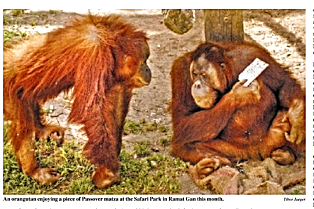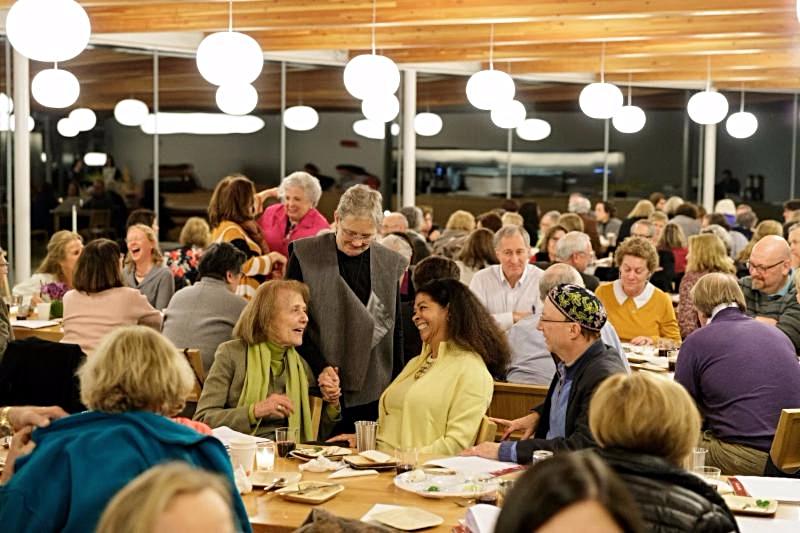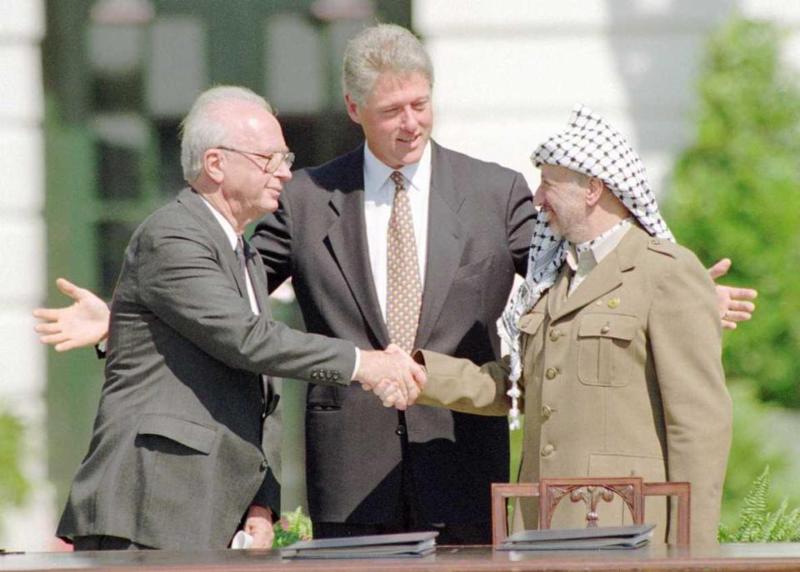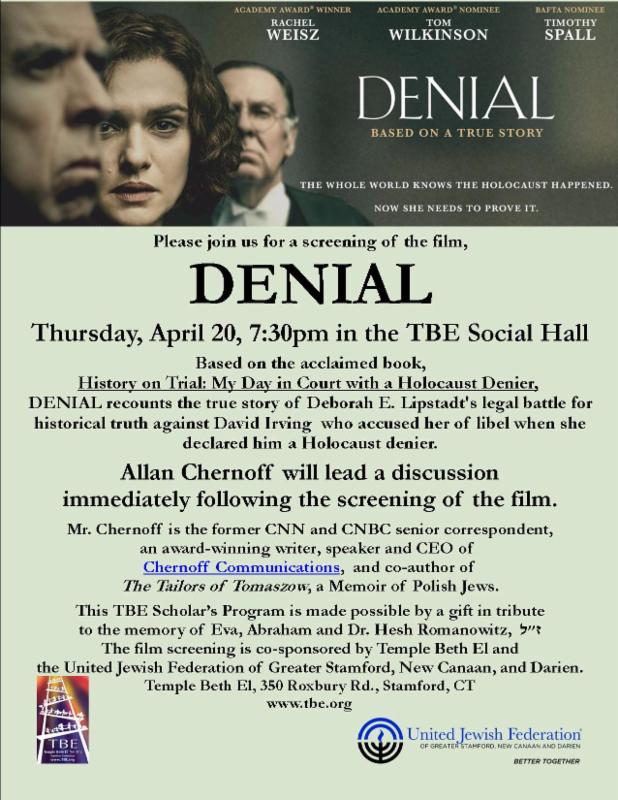
Shabbat Shalom.
With a lovely Passover behind us, we now turn our attention to this weekend's commemorations. Join us for Shabbat services, as we welcome back Cantor Fishman and Musician in Residence Assaf Gleizner tonight at 7:30. Tomorrow at 9:30, we'll discuss the portion Shemini, which contains the laws of kashrut and the topic of our discussion, the creation of a Sacred Community.
Spring is here, and on the Jewish calendar, this is also the time of year for blessing flowering fruit trees. And you don't have to be living along the Potomac to see them - just look outside our sanctuary and lobby windows (and see the lovely new landscaping done last fall combined with the Holocaust Memorial Garden of daffodils planted by our seventh graders many years ago. Those flowers came up this week, just in time for Yom HaShoah. Here is a prayer that Jews say when seeing a fruit tree flower in Spring.
Yom HaShoah and Earth Day
Yom HaShoah and Earth Day are truly commingling this weekend...
The community Yom HaShoah gathering will be held here on Sunday at 4:30. Last night we began our commemoration with a screening of the film "Denial," attended by over 150 people, including, I am happy to say, a number of teens. In Israel's official commemoration ceremony at Yad Vashem, Sunday at 1 PM EDT, the theme will be, "Restoring Their Identities: The Fate of the Individual during the Holocaust." See the introductory and educational materials here. You can watch a live feed of the ceremony here.
Some more material for Yom HaShoah:
- Here is an extensive Holocaust 101 packet, which includes a detailed timeline, F.A.Qs, an extensive glossary of Holocaust terms, some poetic and philosophical material and my article, "Can the Holocaust Inspire a Positive Jewish Identity? Also see this list of dozens (actually hundreds) of excellent books about the Holocaust.
- Here is a packet containing detailed responses to five common Holocaust denial claims.
Several years back, I put together some reflections on how we might address the Holocaust and Earth Day from a theological standpoint. They continue to be relevant, so I share them again below. Next weekend there will be climate marches around the country, supporting the landmark Paris agreement and signaling the need to take further steps to safeguard our planet.
Yom HaShoah Meets Earth Day (Share from Medium site)
This year, Earth Day and Holocaust Remembrance Day fall on the same weekend, giving us an opportunity to explore some connections between the two.
In Jewish tradition, respect for the health of the environment and concern for the dignity of human beings go hand in hand. The Nazis were notorious for their pillage of both the land and its inhabitants, and Eastern Europe is paying the price for that to this day. Judaism is so concerned about the earth that we have our own annual Earth Day, Tu b'Shevat, not to mention a weekly one, Shabbat.
Years ago I visited the site of Dachau, the concentration camp just outside Munich. I say that I visited the "site" of Dachau, because it wasn't Dachau. Yes, the name was there, right next to the infamous inscription, "Arbeit Macht Frei." Yes, the barbed wire was there, and the barracks, remarkably well preserved, and the ovens. Yes, there were memorials to the dead, marking mass graves of nameless victims. But it wasn't Dachau.
Dachau was hell and this wasn't it. There were flowers at this place, surrounded by fresh-cut grass. I could hear birds. I even saw a butterfly, which confirmed for me that this was not Dachau, for the famous Holocaust poem tells us that there were no butterflies in the death camps.
If this was not hell, then what was it, and why did it suddenly look so lovely, so natural? Was this a cruel trick by God, a vain attempt to reclaim that which God had ceded to the beast in humanity in 1933? Or was this God's apology, this smattering of forget-me-nots and daisies embedded in cemetery sod, a plea for forgiveness, too little and too late?
Or maybe God was hoping, beyond hope, to give Jews one last chance to regain the illusion of an attainable paradise on earth, a thin veneer of April hope covering the reality of August hell.
"Here," God is telling us, "I can't give you redemption. All I can give you is this spring-like illusion. Let it ease the pain of your wanderings. Take it."
On Yom HaShoah we say to God that this plan, however comforting and kind, can't possibly work. We reject the illusion. We have seen hell first-hand; it won't be forgotten. Time will not heal this wound. If renewal is possible following the Holocaust, a God who was absent during it cannot bring it about. God, who could not save the Jews, will also not redeem the earth. If renewal and hope are at all possible, only human beings can facilitate it.
Anyone can grow a few forget-me-nots.
There are two seemingly contradictory verses in Psalms: Psalm 24 tells us, "The earth is the Lord's and the fullness thereof," while we read in Psalm 115, "The heavens are the Lord's heavens, but the earth has been given to humankind." This discrepancy can be resolved by drawing from it this lesson: Once upon a time, the earth was the Lord's, but since the Holocaust, it is ours and ours alone.
Before the Shoah, when the earth still belonged to God, we, who had once experienced Paradise first-hand, could only imagine Eden's opposite. As David Grossman wrote in his masterful novel, "See Under: Love," "We always pictured hell with boiling lava and pitch bubbling in barrels," until the Nazis came along, "showing us how paltry our pictures were."
Now, nothing is left to the imagination. The earth is ours and we are utterly responsible for all that happens to it; all of it, the people, and the flowers, too. Those flowers at Dachau have become a symbol of God's ultimate helplessness and our ultimate responsibility. We still pray, though no longer for divine intervention, but in gratitude for the basic tools provided us: warm summer days, rain in its season, the miraculous ecosystem. We look to heaven for resolve but little else, for "the earth has been given to humankind."
And the blood of our brother Abel is screaming from that very earth. We must care for the earth because our ancestors and martyrs are buried within it. The earth is not only their legacy their blood, to us; it is them, their bones, their illusions, their dreams and their follies. Their cries seep through the ozone layer. Their tears fall as acid rain. Defoliated rain forests uncover their nakedness. We cannot go anywhere without walking on their bones. We must tend to their graves.
The earth is not only ours, it is us. Chief Seattle, a Native American leader of the last century, wrote, "This we know, the earth does not belong to us; we belong to the earth." And in time our bones will rest there too, serving as a firm platform upon which our grandchildren will walk.
In caring for our planet, we sanctify the names of those who died and affirm life for those not yet born. We do it not out of the illusory hope that the world can be as it was, for we shall never return to Eden. We do it because we have to, because it is our responsibility. No one else will do it for us. And if we succeed, if the world becomes a better place for our grandchildren, then we'll have taken a small step toward resuscitating a measure of hope. This is the best we can hope to accomplish in the aged of scorched flesh and earth.
So this year, I'll mark Earth Day and Yom HaShoah with sadness and grim determination.
Because as a Jew, a human being and a guardian of the planet, I have no other choice.
Time to Stop Dinkin' and Dunkin' on Jewish Identity
In an op-ed in last week's Jewish Week, Rabbi Elliot Cosgrove laid out a plan for mass dunkings of American Jews in ritual baths in order to resolve a growing crisis of Jewish identity. I would call it a crazy idea, except that I proposed something very similar myself, three years ago, something I called a "Bath Mitzvah," whereby all Jewish children would be dunked in massive splash parties, which would provide a solution to the question of differing definitions of who is a Jew, in a manner that upholds the integrity of all the religious streams. Cosgrove extended this to a pre-marriage immersion, something that I avoided because once you pass bar/bat mitzvah age, conversion becomes much more complicated.
His article got considerable attention, including this retort by Shaul Magid in the Forward, which asserts that our focus should be less on conversion (and by extension intermarriage) and more on the kind of Judaism we are nurturing. He writes, "Unfortunately, what results from this focus on survivalism is that Judaism's greatest assets are sometimes cast aside to insure that one's grandchildren will be able to call themselves Jews even though they may no longer know, or care, what that means. Judaism is quickly becoming a tool for the survival of the Jews rather than an ancient tradition that offers wisdom toward a meaningful life."
I agree with Magid that Cosgrove's plan is more focused on the institutional angst of the Conservative rabbinate than the real-life situation of American Jews. I understood that my plan could only work if it achieved universal buy-in from the American Jewish leadership. It's not happening any time soon, in large part because the American Jewish establishment is almost completely lacking in creative vision. They haven;t generated anything really big since Birthright Israel, and that was really generated on the outside and then absorbed by the mainstream. We need a Birthright-type initiative that would help transition American Jewry to a "post-gevalt" posture on intermarriage, redirecting our entire focus to fully embracing all Jewish children, including those of the 50 percent of Jewish millennials who grew up in blended-faith families.
During Passover, I immersed myself (keeping with the dunkin' theme) in a new symposium produced by Moment magazine, "What Will the Jewish World Look Like in 2050?" Dozens of experts weighed in from American and Israel. It was interesting - and we'll be looking at it closely at our Shavuot Eve study session this with Temple Sinai. There have been other attempts to tackle this question too, and within the Conservative Movement, a new white paper on patrilineal descent by Rabbi Chuck Simon. But what's missing are bold new proposals like Birthright, that can bring us together. Now is not the time for parochial thinking.
Now is the time for us to throw the ball far downfield, to use a football analogy, rather than continuing our incessant dinkin' and dunkin'.
If we can develop a universal standard for Jewish identity, who knows what big thing we might tackle next?
How about this?
How about we grant all these universally accepted Jews automatic citizenship in Israel, including the right to vote (much as US citizens living in Israel get to vote in US elections, including many who never actually lived in the US); provided they meet certain conditions, perhaps involving spending a certain amount of time in Israel or performing some sort of broadly defined national service for the Jewish people?
Sound good?
Let's chew on that one for a while. What would it mean for the Jewish people of the Diaspora to have more than a vicarious involvement in Israel's future? What would it mean for Israel to have suddenly several more million voting Jewish citizens? What would it mean for Israeli democracy to have a clear majority of voting Jews living in its territory, but one with a majority committed to liberal (in the broad sense) democratic values and human rights as well as security? What would it mean for Jewish peoplehood to have the freebies of Birthright augmented by a vastly expanded program of volunteering and national service, which would include coexistence work? What would it mean?
What would it mean for Jewish leaders to think big?
Time to stop dinkin' and dunkin'.
Shabbat Shalom





